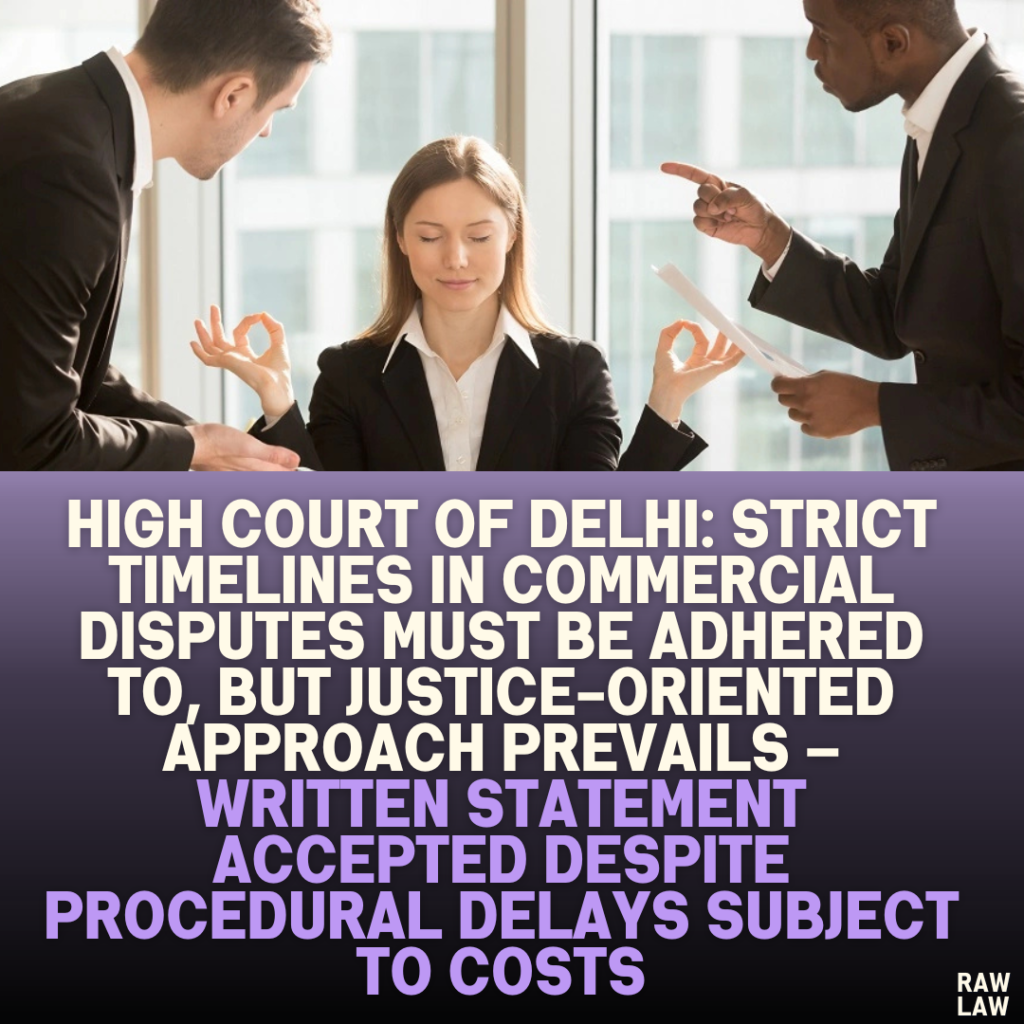Court’s Decision:
The Delhi High Court set aside the trial court’s decision to reject the petitioners’ application for condonation of delay. The High Court directed that the WS be accepted, provided the petitioners paid a cost of ₹30,000 within two weeks.
The court emphasized the need for a liberal and pragmatic approach, especially in commercial matters, to ensure disputes are resolved on their merits and not dismissed on procedural grounds.
Facts:
- The petitioners were defendants in a commercial suit where summons were served on them on 20.08.2023 (as assumed by the trial court).
- The petitioners failed to file their WS within the statutory 30-day timeline stipulated under the Commercial Courts Act, 2015.
- Subsequently, the trial court closed their right to file the WS on 09.11.2023.
- The petitioners prepared the WS by 08.11.2023 but could not file it due to incomplete supporting documentation. They eventually filed the WS through e-filing on 29.11.2023 and submitted a hard copy on 30.11.2023.
- The trial court dismissed their application for condonation of delay, citing deliberate negligence and an intention to delay proceedings.
Issues:
- Could the delay in filing the WS be condoned under the Commercial Courts Act, 2015?
- Did the trial court err in rejecting the condonation application without considering the petitioners’ genuine logistical challenges?
Petitioners’ Arguments:
- Delay Justified by Logistical Issues: The petitioners argued that they were based in Mumbai and faced challenges arranging for a Delhi-based advocate. Additionally, the absence of their Authorized Representative delayed the signing of necessary documents.
- No Intention to Delay: They contended that the delay was inadvertent and could be remedied through the imposition of costs.
- Justice-Oriented Approach: The petitioners urged the court to adopt a liberal and pragmatic approach to ensure the case is resolved on its merits.
Respondents’ Arguments:
- Strict Timelines Mandatory: The respondents emphasized the importance of adhering to the 30-day deadline and the extended 90-day period prescribed under the Commercial Courts Act.
- No Valid Reason for Delay: They argued that the petitioners failed to offer credible reasons for their failure to file the WS within the stipulated timeframe.
- Deliberate Negligence: The respondents alleged that the petitioners’ actions demonstrated gross negligence and an attempt to delay the trial.
Analysis of the Law:
- Statutory Timelines: Under the Commercial Courts Act, WS must be filed within 30 days of service of summons. An additional 90 days may be granted for justifiable reasons, but beyond 120 days, the right to file the WS is forfeited.
- Judicial Precedents:
- Esha Bhattacharjee v. Raghunathpur Nafar Academy: Advocated for a liberal, pragmatic, and justice-oriented approach in condonation of delay cases.
- Ramlal v. Rewa Coalfields Ltd.: Emphasized that substantial justice should not be defeated by rigid procedural adherence unless the delay is inordinate.
- Collector, Land Acquisition v. Katiji: Highlighted that courts should prioritize adjudicating matters on merits over procedural technicalities.
- P.K. Ramachandran v. State of Kerala: Stressed that condonation of delay must be based on reasonable and credible explanations.
Precedent Analysis:
The High Court relied on past judgments to highlight that:
- Reasonable Explanation: Courts should assess whether the explanation for delay is reasonable and genuine, not fabricated or fanciful.
- Substantial Justice: When the delay is not inordinate, courts should prefer adjudicating the dispute on its merits.
- Judicial Discretion: Courts must exercise discretion judiciously, balancing procedural rigor with the overarching goal of justice.
Court’s Reasoning:
- Logistical Challenges Considered: The High Court acknowledged that the petitioners faced genuine logistical difficulties, including their Mumbai location and the unavailability of their Authorized Representative.
- Delay Within Permissible Limits: The court noted that the WS was filed within the extended 90-day period, even though procedural lapses caused delays.
- Justice-Oriented Approach: Citing judicial precedents, the court emphasized that procedural timelines should not obstruct substantial justice, particularly in commercial disputes.
- Cost Imposition: To balance the respondents’ inconvenience caused by the delay, the court imposed a cost of ₹30,000 on the petitioners.
Conclusion:
The High Court set aside the trial court’s order and directed that the WS be accepted upon payment of costs. It reiterated the importance of resolving commercial disputes on merits while maintaining procedural discipline.
Implications:
- Flexibility in Procedural Compliance: The judgment underscores that procedural rules, while important, must be balanced against the need for justice.
- Commercial Litigation: It emphasizes the significance of a justice-oriented approach in commercial disputes, ensuring parties are not denied a fair trial due to procedural lapses.
- Precedential Value: The case reaffirms established principles on condonation of delay and provides a roadmap for dealing with similar issues in the future.
